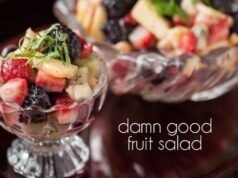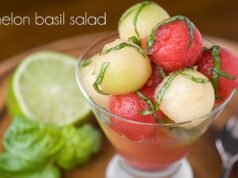This orange ginger dressing is a bright, zesty, and tangy Asian-inspired vinaigrette that highlights the fresh flavor of oranges and the subtle heat of ginger.

It’s been a long time since I purchased any sort of bottled dressing from the grocery store. And we eat a lot of salad! Most store-bought dressings just don’t compare in freshness or in flavor, and once you get into the habit, it doesn’t add a lot of time to the dinner process. Most homemade vinaigrettes and dressings can easily be whipped up in 5-10 minutes, including this orange ginger dressing.
All in all, homemade dressing is healthier, simple enough to make, and just great to have in the refrigerator for healthy recipes all week.
I made this particular orange sesame ginger dressing for my Mandarin Chicken Salad, but it would go great on any Asian-inspired salad, or even on this holiday favorite kale and pomegranate salad. It has a bright, tangy flavor and a lovely heat from the fresh ginger. It’s a great way to enjoy oranges while they’re still in season!

Why You’ll Love this Orange Ginger Dressing Recipe
It is so simple and quick to make! No need for an immersion blender or a food processor. Just whisk the dressing ingredients together and you’re good to go.
In addition to fresh juicy oranges, it uses pantry staples and doesn’t require any fancy ingredients. There are also easy swaps available for some Asian condiments you might not have in your pantry.

This light citrus dressing tastes great on so many salads! It has the perfect balance of flavors -bright, sweet, tangy, and a little spicy from the fresh ginger. It will lighten up any simple green salad.
It’s a great recipe to make ahead and store in the refrigerator to quickly toss with a salad for busy weeknights.
Ingredient Notes

Orange Zest
The orange zest adds a bright, citrusy aroma and flavor that enhances the overall freshness of the dressing. Make sure to only zest the orange part to avoid the bitter white pith! A microplane zester is the best tool for this job.
Orange Juice
Orange juice is the base of this dressing so I do recommend using fresh orange juice for the best flavor. It adds both a nice sweetness and a bit of a tang to the dressing.
I usually use navel oranges but go with your favorite variety. Cara cara, mandarin oranges, or blood oranges are all great options.
Rice vinegar
The rice vinegar adds a nice mild and slightly sweet acidity. If you don’t have rice wine vinegar, you can just substitute with white vinegar or apple cider vinegar.
Dijon Mustard
The Dijon mustard adds a sharpness that goes well with the sweetness of the oranges. It also helps emulsify the dressing!
Soy Sauce
Soy sauce is a must in most Asian-inspired dishes for its umami flavor profile. It’s a small but essential component for rounding out the taste.
Honey
Brings a natural sweetness that balances the acidity and bitterness, smoothing out the orange ginger dressing’s overall flavor. You can also add maple syrup in place of the honey if you’d like.
Ginger
I like to grate fresh ginger to add in this dressing and it makes such a difference! Ginger has a pungent, almost spicy flavor that goes so well with the oranges.
How to Peel Ginger
Peeling ginger might seem tricky because it’s all bumpy and oddly shaped, but there’s a really easy way to do it without wasting any of the good stuff. Here’s a simple method to peel ginger that’ll save you time and ginger!
Choose the Right Tool
The best tool for peeling ginger is not necessarily a peeler or a knife, but a common teaspoon. The edge of the spoon is sharp enough to remove the skin without taking off too much of the flesh underneath, which is often the case when using a peeler or knife.
Preparing the Ginger
First, rinse the ginger root under cold water to remove any dirt or debris. Since the skin is so thin, you’ll want to make sure it’s clean before you start peeling.
Peeling with a Spoon
Hold the ginger in one hand and your spoon in the other. Use the edge of the spoon to scrape the skin off. You’ll notice how the spoon easily lets you peel around all the knobs and bumps of the ginger without taking too much of the ginger itself. Here’s a video to demonstrate
Getting into the Nooks and Crannies
For those hard-to-reach places, just use the tip of the spoon to scrape the skin away. The spoon is pretty flexible, so you can get into all the nooks and crannies easily.
After peeling, your ginger is ready to be chopped, grated, or sliced for whatever you’re cooking up. To grate ginger for this recipe, use the small holes of a box grater, or a microplane grater.
If you have leftover ginger, wrap it in a paper towel, place it in a plastic bag, and store it in the crisper drawer of your refrigerator. For even longer storage, unpeeled ginger can be stored in the freezer in a sealable bag, and you can grate it while it’s still frozen for future use.
Olive oil
Olive oil is my oil of choice for most dressings (and cooking in general) and is the base of this orange ginger dressing and also the emulsifier. Make sure you use good quality olive oil for the best flavor.
Peanut oil, avocado oil, grapeseed oil, canola oil, or any neutral oil that you like can also be used.
Toasted Sesame oil
Sesame oil, particularly toasted sesame oil, has a pretty strong flavor so I use it sparingly. It adds a nutty flavor to the dressing. You can skip this if you don’t have sesame oil in your pantry.
Don’t forget to watch the video!
Most of my recipes include a short step-by-step video tutorial. Just scroll down to the recipe card, or use the “Jump to Video” button at the top of the post!
Step by Step Instructions
Combine the orange zest, orange juice, rice vinegar, Dijon mustard, soy sauce, honey, and ginger in a small bowl.

Slowly add in the olive oil while whisking it constantly till it is emulsified.

Add the sesame oil, salt, and pepper at the end and whisk to combine.

You can taste and adjust seasonings according to what you like. If you want it tangier, add a bit more rice vinegar. If you’d like it sweeter, you can add some more honey. If you want more of a kick in it, you can add more fresh ginger. And if you don’t want a strong ginger flavor, you can lessen the quantity!
Recipe Tips
- The fresher your ingredients, the brighter and more vibrant your orange ginger dressing will taste. Fresh juice and fresh ginger will provide the best flavor.
- The key to any great dressing is the balance between acidity and oil. Start with a basic ratio of one part acid (rice vinegar in this case) to three parts oil, then adjust according to your taste.
When I was developing this recipe, I mistakenly thought the orange would provide the necessary acidity, but it turns out it mostly provides sweetness and flavor, and the rice vinegar is definitely necessary for acidity. Adjust the quantity to your taste!

- Slowly whisk the oil into the other ingredients to create an emulsion. This process thickens the dressing and helps it cling to your salad ingredients better. Instead of whisking, you can put all your ingredients in a jar with a tight-fitting lid and shake vigorously.
Storage Instructions
Store any leftover dressing in a glass jar with a tight-fitting lid, in a mason jar, or any airtight container. This helps to preserve the flavors and prevents the dressing from absorbing odors from the refrigerator.
Your homemade orange-ginger vinaigrette will keep well in the fridge for about a week. The ingredients will separate over time, but you can just give it a good shake to recombine before using.
Yes, you can use bottled orange juice if fresh oranges aren’t available, although fresh juice provides the best flavor.
Yes, peeling the ginger is recommended to avoid any bitter taste that the skin might impart.
Yes, you can use ginger powder as a substitute for fresh ginger, but start with a smaller quantity since it’s more concentrated in flavor.
Tell me what you think!
If you try this recipe, l’d be so grateful if you’d leave a comment and a rating in the recipe card. I love to hear your feedback, and your tips can help other readers too!

Orange Ginger Dressing
Tools for This Recipe
-
Microplane zester
Ingredients
- 1 tablespoon orange zest from about 1 orange
- ⅓ cup orange juice freshly squeezed, from 1-2 oranges
- 2 tablespoons rice vinegar *see note
- 1 teaspoon Dijon mustard
- 1 teaspoon soy sauce
- 1 teaspoon honey
- 2 teaspoons grated ginger
- ⅓ cup olive oil
- ½ teaspoon sesame oil
- Salt and pepper to taste
Instructions
-
In a small bowl or measuring cup, combine the orange zest, orange juice, rice vinegar, Dijon mustard, soy sauce, honey, and ginger.
-
Slowly drizzle in the olive oil, whisking continuously until well combined and emulsified.
-
Add sesame oil, salt and pepper and whisk to combine. Taste and adjust seasonings if necessary. If you would like a tangier dressing, add a little more rice vinegar.
To grate ginger, use the small holes of a box grater, or a microplane grater.









